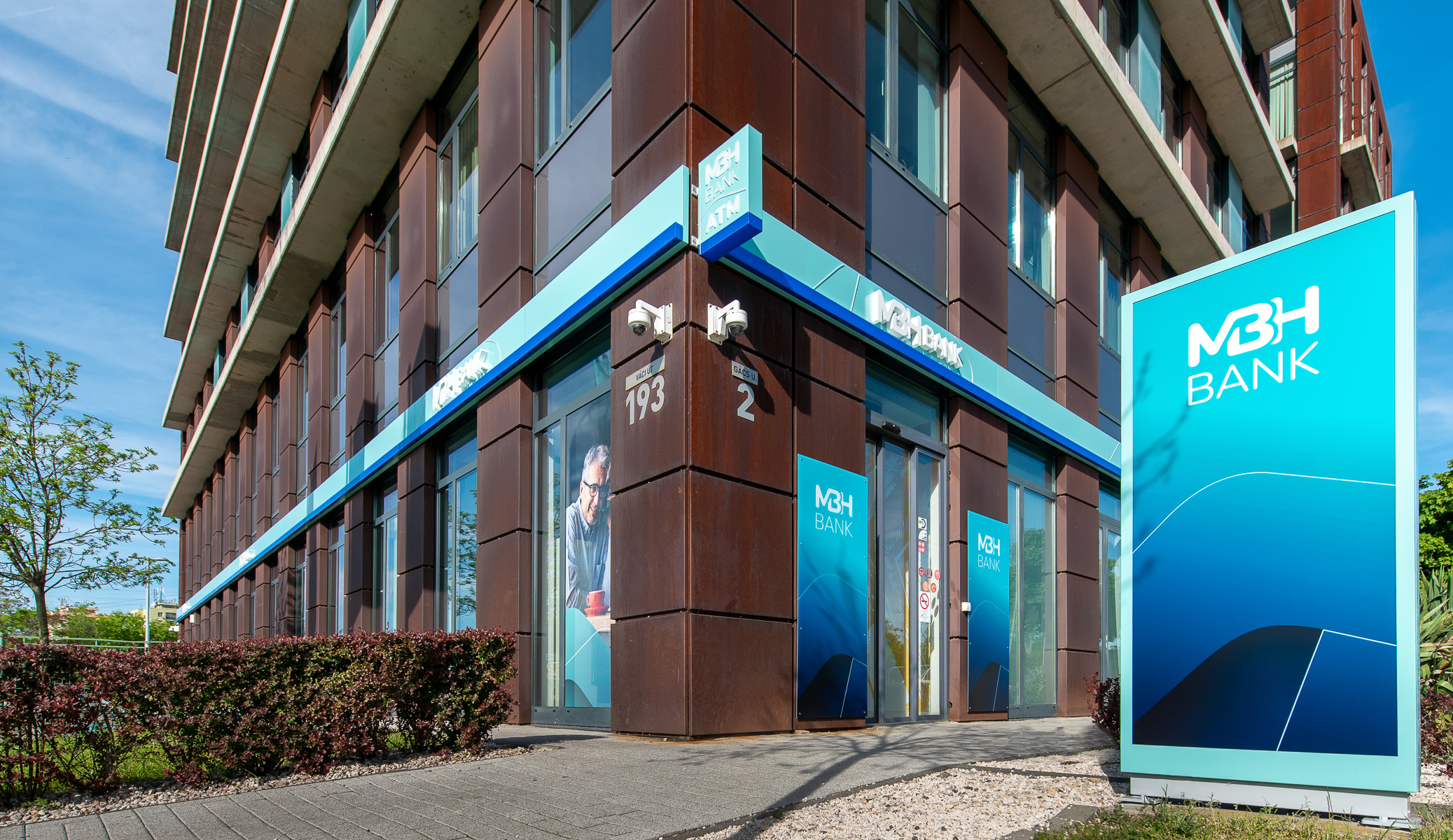Magyar Bankholding Prepares for Final Merger With Good Results

Levente Szabó
The chief business officer of individual services at Hungarian Bankholding, Levente Szabó, reveals the details behind strong corporate lending results and discusses the final steps in a three-way tie-up to create the country’s second-largest commercial lender.
BBJ: 2022 was a busy year in finance. How did Magyar Bankholding fare last year in its corporate lending and investment service results?
Levente Szabó: Despite a rather hectic business environment, at the end of Q3, the MKB Group’s corporate loans amounted to HUF 2.577 trillion, an increase of 25.9% year-on-year. This growth reflects some one-time issues, like the impact of the acquisition of the Sberbank portfolio, some large individual transactions, and the effects of the exchange rate changes. Business demand for loans rebounded strongly in Q3 2022 after a small decline. The main focus was on the launch of the new Széchenyi Card MAX program products. Since a significant part of the micro and small business lending volume has been contracted through this scheme, the launch and disbursement were prioritized. This is because MKB Bank was also at the forefront of the subsidized loan programs and guarantee schemes included in the economic stimulus packages, which have generated significant demand among customers since their introduction, and there have been substantial changes in these products in this period.
Regarding investment services, as inflation hit a record high in 2022, investors, including our clients, rebalanced their portfolios. In the changing inflation and yield environment, the previously more popular MÁP+ was replaced by the inflation-tracking PMÁP, which became the focus of customer demand and sales. In addition, the sale of fixed-rate bonds with maturities of up to one year, and discount treasury bills, has become increasingly important. Another strong feature of Q3 was that investors turned to the money market, short bond, and fixed-income securities, which offer increasingly higher nominal returns, by selling equity-type investment funds as short- and medium-term uncertainties intensified.
BBJ: Do you see a rise in interest for subsidized lending programs?
LSz: There is a clear shift in the lending focus of mid and large corporates, with long-term funding now being less common and more focused on working capital financing. The demand is real, and the volume of working capital loans requested from the bank has increased. Those lucky enough to have been able to borrow some longer-term funds in the last two-three years, even at the low-interest costs of the time, are in a good position. These firms can now rely heavily on these funds, as they can invest at lower financing costs.
In February, Exim Bank launched the Baross Gábor Re-industrialization Loan Program to support Hungarian SMEs and large corporates most affected by the energy crisis. The package aims to provide investment, working capital, and green loans to Hungarian entities at favorable interest rates and with flexible terms, helping the competitiveness of participants.
In addition, the Széchenyi Card MAX+ loan program also promotes the competitiveness of domestic MSMEs and supports sustainable growth, continuing to provide interest rate subsidies and lower guarantee fees for the borrowers. Companies are now looking to secure liquidity, so the aim is to create and increase overdraft facilities and obtain specific medium-term loans to help working capital. In the case of large corporates, we are currently seeing these objectives being reinforced.
BBJ: The spring merger of MKB Bank and Takarékbank is the final step in a three-way tie-up to create Hungary’s second-biggest commercial lender. How is Bankholding preparing for this?
LSz: On April 30, MKB Bank Plc. and Takarékbank Ltd. will merge, and the merged bank will operate under a single brand as MBH Bank Plc. Following the merger, former MKB Bank and Takarékbank branches will gradually change their brand visuals in stages during the year. Many colleagues are working to ensure that the merger goes smoothly so that, from May, customers will benefit from an integrated and modern large bank, offering a unified product portfolio and a wider national branch network backed by an even more advanced technological platform.
BBJ: Where does Bankholding stand on the factoring market with three merged factoring companies (MKB, BB, and Takarékfaktor), and what are its ambitions for the future?
LSz: Individually, they were crucial actors in the Hungarian market with significant customer portfolios and financed turnover for each player, but in different segments. The merger will create the market’s second-largest operator in terms of the number of clients and portfolios. But that is only a start, given that each bank is a market leader in corporate finance or the agricultural segment. By optimizing processes and exploiting the synergies of the merger, the group can achieve significant growth in its existing client base. In the short-to-medium term, the goal for the bank, like many of its corporate financing services, is to achieve a market-leading position in factoring.
BBJ: How can factoring help finance the medium and large corporate sectors?
LSz: Surprisingly, factoring services are no longer only used by SMEs but are becoming more common in the medium and large corporate segments. In addition to financing, factoring services also include, for example, risk management and accounting benefits, which are of considerable value to a large company. Liquidity financing as a service remains an essential element of clients’ contracts, but in the large corporate segment, it is now more important if the provider bank can offer a customized solution to help the client deliver risk-free to new partners or new foreign markets. In addition to risk management, another essential service for large corporates is so-called “working capital management” services, whereby the bank can help, whether on the supplier or customer side, achieve strategic financial goals by improving turnover rates or even by taking over entire customer portfolios on a temporary or permanent basis.
BBJ: Bankholding is the only Hungarian bank operating a separate agribusiness. How important is agriculture for the group, and what are the main challenges in this sector?
LSz: Our group is a leader in financing agribusinesses; in some segments, we perform well above the market. This is mainly due to our strong rural presence and rich market expertise. Great importance is attached to the agricultural sector. In recent years, it has become even more apparent that it is in the interests of society to support and develop the domestic food processing industry. The merger has also expanded our portfolio, adding food and larger agricultural businesses producing for export to our client base, creating an ideal client mix. Our agricultural model is unique in Hungarian banking. We believe that the main challenge facing the sector in the coming decades is to ensure that the growing urban population can be supplied with food of sufficient quality and, crucially, at affordable prices. As a bank, we need to facilitate this adaptation.
BBJ: What is Bankholding’s vision for the domestic agribusiness industry? Does sustainability play a significant role in the plans?
LSz: The Common Agricultural Policy will provide the sector with unprecedented development funding, and the pandemic has highlighted the importance of food self-sufficiency. Food production is a strategic sector, and Bankholding plays a key role with its expertise and knowledge. As a lender and financial service provider, we take a leading role in developing the Hungarian food economy and making agriculture efficient and sustainable economically, socially and environmentally.
This article was first published in the Budapest Business Journal print issue of March 24, 2023.
SUPPORT THE BUDAPEST BUSINESS JOURNAL
Producing journalism that is worthy of the name is a costly business. For 27 years, the publishers, editors and reporters of the Budapest Business Journal have striven to bring you business news that works, information that you can trust, that is factual, accurate and presented without fear or favor.
Newspaper organizations across the globe have struggled to find a business model that allows them to continue to excel, without compromising their ability to perform. Most recently, some have experimented with the idea of involving their most important stakeholders, their readers.
We would like to offer that same opportunity to our readers. We would like to invite you to help us deliver the quality business journalism you require. Hit our Support the BBJ button and you can choose the how much and how often you send us your contributions.







